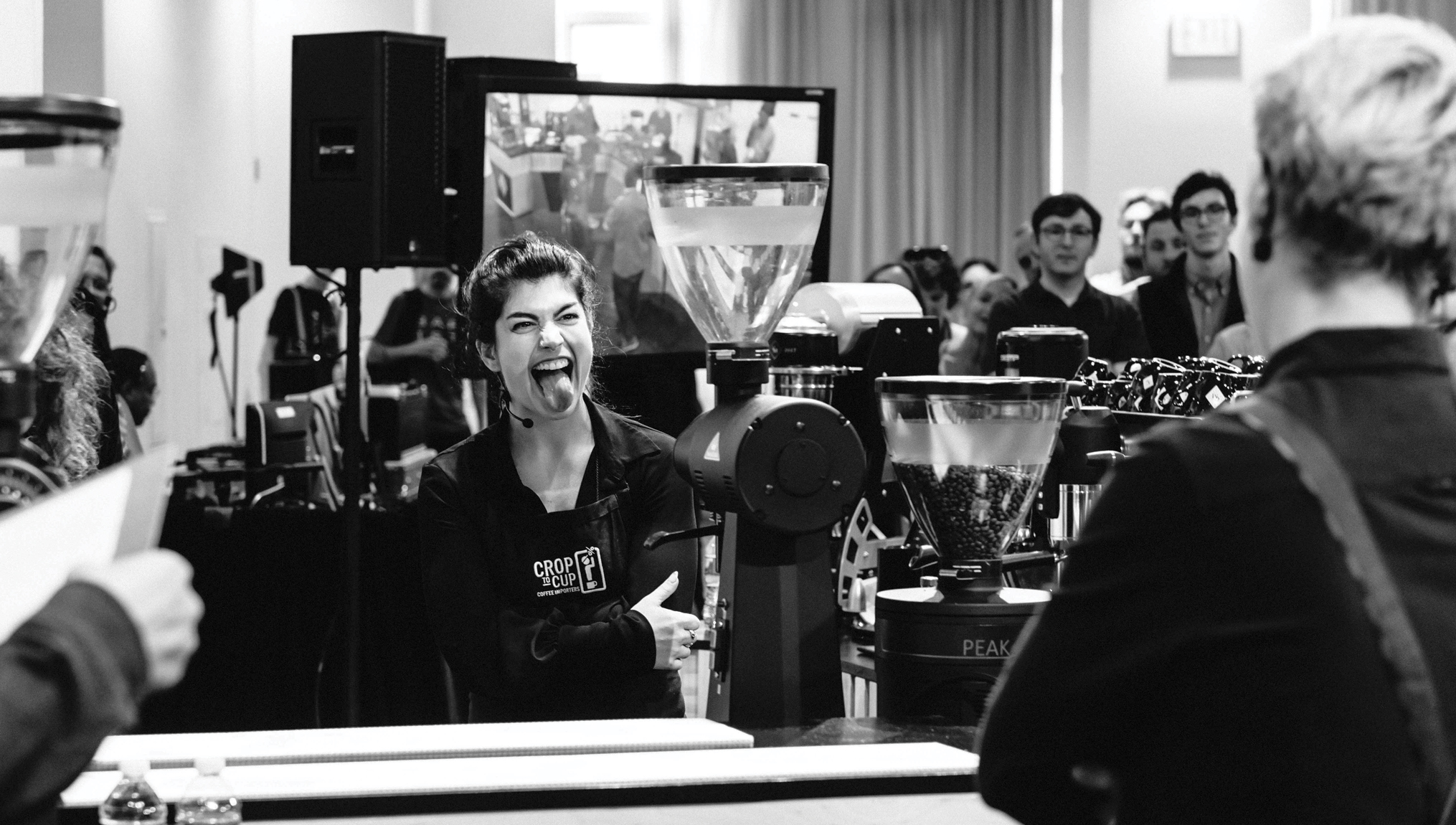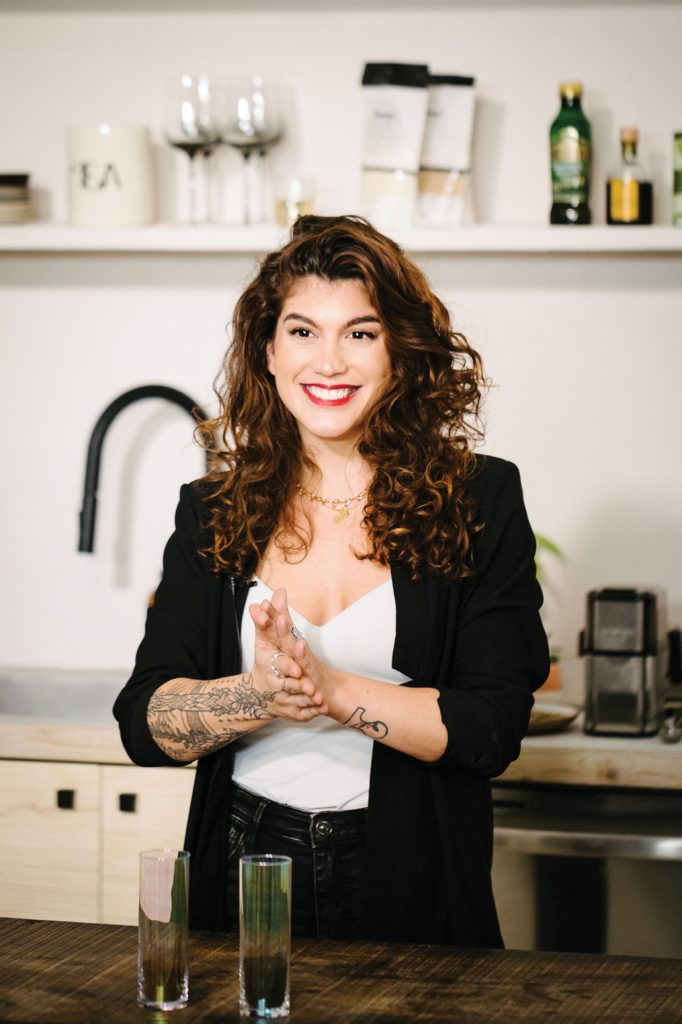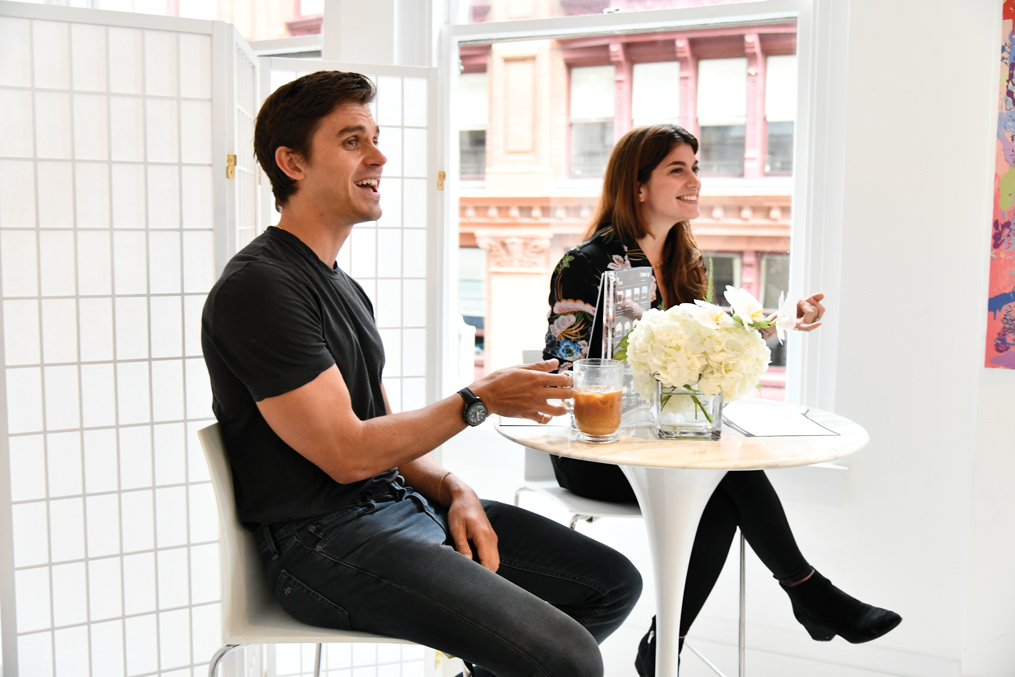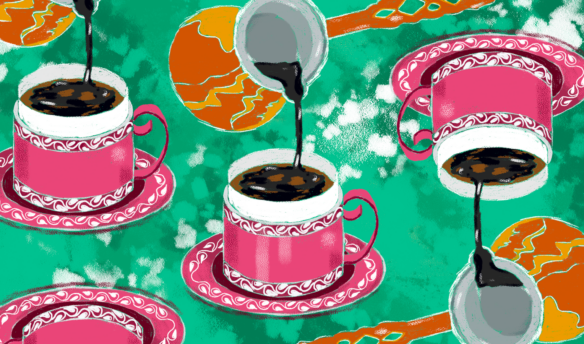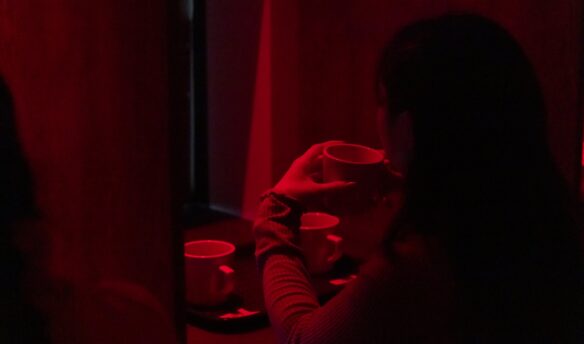Erika Vonie competing at Coffee Masters NYC in 2017. Photo by Gary Van Handley
Erika Vonie always knew she would succeed in coffee.
“I’m a very stubborn and strong-willed person,” explains Vonie, who has harnessed that drive to propel her to, among other achievements, a Coffee Masters victory in 2017. After various roles in the industry, from café management to green buying, she moved into the tech world as Director of Coffee for the online coffee marketplace Trade. This experience, combined with nearly 15 years spent working across the coffee industry, has allowed her to gain unique insights into the consumer mindset. She has shared this knowledge during lectures at the Specialty Coffee Association’s Bloom tour and Expo, and will continue with the launch of her latest project: Vonie left Trade in 2019 to become a freelance consultant and educator.
Her goal is to demystify the specialty coffee industry for the average consumer.
“This is the hill that I’m dying on,” she says. “It’s why I started my consultancy.”
As an example, she talks about language, and terms like “single origin” being an obstacle for many consumers.
“The vocabulary that we use puts up this insanely prohibitive barrier for people,” she says. “I think that’s a big reason why people don’t buy any specialty, and why there’s this idea that specialty is pretentious. Because you have to learn a language in order to interact with us.”
Vonie spoke to Fresh Cup about her career, winning Coffee Masters, her work with Trade, and forging her own path in the industry.
This interview has been edited for length.
Fresh Cup: Tell us a little about your background and how you got into specialty coffee.
Erika Vonie: I got my first coffee job to help pay my way through college, at a second-wave café, and I worked there for four years. I went to film school, and then when I graduated in 2009 in the middle of the recession there weren’t a whole lot of jobs. But luckily I had been working in coffee, so I kept getting coffee jobs. The first coffee job that I got after college was at a specialty café called Lovers and Madmen in West Philly. It’s not there anymore, but it was a Counter Culture [Coffee] account. And I think I was pretty lucky that they were the company that provided the coffee, because they had all this education and training and I just threw myself into it.
I did some stuff with my degree, but honestly the most fulfilling professional thing that I was working on was always coffee. I was fascinated by how much there is to learn and there’s a trillion different avenues you can go down. Then I learned about the supply chain and there’s just an infinite amount of things to be excited about and that’s really what started it all off.
FC: You won Coffee Masters in 2017. What was that experience like, and what did it do for your career?
EV: Winning Coffee Masters impacted my career in positive, network-expanding ways I could never have dreamed of. It’s allowed me to travel internationally, meet people who have become true friends, and be involved with some pretty amazing media opportunities.
More importantly, it was the moment I finally believed in my abilities and skills as a barista. When I won, I had been sober for about four months and had left a toxic work environment a month prior, so everything was really in flux for me. Winning that incredibly in-depth and intense competition was a moment of clarity, that when I focus on myself and what’s best for me, regardless of anyone or anything else, my true power is known. It’s always been there inside of me, and it still is, and winning Coffee Masters taught me what I need to do to access it.
FC: Will you compete in the future?
EV: The only competition I’ll ever compete in again would be if they did like a Hunger Games-style Quarter Quell in Coffee Masters, where they bring all the coffee masters back to compete against each other. I see competition as a way to open doors for you professionally, and I believe that I’ve opened all those doors for myself and that if I go back and compete, I’m closing those doors for other people. So I don’t want to close any doors. I want to keep them wide open.
FC: What was it like to work for Trade within the coffee-tech overlap, and how do you see that overlap shaking out more generally?
EV: It’s really weird being a coffee department of one at a tech company. I had a fantastic experience there, and it was nice to step into a role where everyone took my expertise incredibly seriously. My word was bible essentially, because no one else on staff in senior level positions worked in coffee. I loved everything that I worked on, and I learned a lot. I mostly learned a lot about consumer data, because that was something that Trade had access to that I was really excited about. Anecdotally, working behind bars, you get a general sense of what customers like, but having hard data to back it up was really cool.
In a more general sense, by and large I see people who don’t have coffee experience, whether it’s commodity or specialty experience, start to step into the scene with preconceived notions of what they can do for the industry, not necessarily understanding the fabric and the structure of what [the industry] really is. And I think a lot of it is because they don’t necessarily understand how razor-thin all the margins are in the coffee industry. I don’t think it’s going away anytime soon, I just don’t know how successful this tech-coffee crossover is going to ultimately be.
FC: Why did you decide to go solo as a freelance consultant?
EV: It’s something that I’ve wanted to do for a while. I actually left to focus on my health—my health took an extreme downturn at the end of September, and so I spent October making plans, getting healthy, just taking care of myself, giving myself space. And then in November I started reaching out to companies. I’ve been talking with a few different companies—there’s marketing I can help with, QC, barista training. A bunch of different things.
And in addition to my consultancy, I’m also spinning up an educational YouTube page, which is devoted to bridging the gap between the specialty and just normal American coffee drinkers. Instead of lowering the bar, it’s like, well, how do we make it better? How do I use my 15 years of experience in the industry to teach people who can’t afford a Baratza Sette or a Moccamaster or a gooseneck kettle, or they don’t have time in the morning to make a pour-over? How do I teach them how to use their stuff to make the best cup of coffee available? That’s something that I’ve really wanted to do for a very long time.
FC: Can you tell us a little bit more about your views on consumer accessibility?
EV: Customers are willing to pay a little bit more for something that is exponentially better. Customers want that, and they want to feel special and they want something that’s personalized with a lot of variety. One of the biggest drivers for consumers was just the amount of roasters that [Trade] had on the site. Customers want variety first and foremost, and they want to be empowered to find the thing that they like.
Another thing that was really surprising, but also sort of not surprising, is that Trade sold a lot of a category called “Roasty & Smoky,” which is coffee that has been pushed to second crack. There were customers that would be so pumped to pay $17–18 a bag, because they love that style of coffee. At that price point the green is very good, and the dark roast has nuanced flavors to it, and we as an industry don’t even look at that. It’s a huge cash cow for this industry; we could acquire all of these customers. Do you want the customer and do you want the customer to be happy, or do you want to force them into a taste profile or make them learn a language that they don’t understand?
FC: What are your plans for the future, on a personal level?
EV: As far as the consultancy goes, I’m kind of just letting that be a baby that is growing organically. I don’t have a ton of hyper-focused plans for that, I’ve got a couple of clients under my belt right now and I’m really happy figuring that out. For the YouTube education page, I’m very excited to start showcasing people that don’t necessarily get the limelight. I also have fun theories that I’m ramping up on ways to taste coffee if you’re not a Q grader or a professional. How to take a sensory course, essentially.
FC: Where do you see the future of coffee going, in terms of the industry and the environmental side?
EV: I think we have every right to be terrified. The cost of coffee is out of our hands for the most part. There’s things that specialty can do. Figuring out tech that can help agriculture or, I’m not a blockchain expert, but it seems like that might be a way to funnel more capital into our supply chain. Things like that I would really like to see because climate change is going to wipe out a ton of it. Some of our favorite coffees are already on the way out and it’s just going to continue. I think the shift will be towards lower end coffees. Another reason why I want people to start getting used to dark roasts is we might not have 90-plus [coffees] in 10 years.
FC: How do you stay motivated, in light of all that?
EV: I stay motivated by just doing what I can. I can’t solve every problem; I’m not a superhero. I know what I contribute, and I think I finally know what my value and my worth is in this industry. So as long as I stay true to myself and keep putting myself out there, I keep trying to make specialty a better place than I found it—that is the reason for me to get up every morning and to keep doing it.



